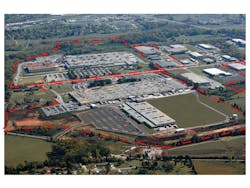Toyota's Denso Expanding US Plant, Adding 1000 Workers for EVs, Car Safety Systems
Japan’s Denso Corp. is placing a $1 billion bet that the U.S. auto sector’s future is electric.
The parts supplier said on Oct. 6 that it will invest that much to expand its factory in Maryville, Tenn, to make components for electrified, connected and self-driving cars. The factory’s customers include the Detroit Three and Japan-based carmakers, said Bill Foy, senior vice president of engineering for Denso International America.
The expanded facility will become one of the largest automotive component factories in North America at a time when EVs with autonomous and connected features are entering high-volume output for the first time.
Parts to be made on the expanded production lines will include things like radar sensors for self-driving and data control modules that connect moving vehicles to the internet, allowing manufacturers to send over-the-air software updates -- modern new additions that are seen becoming standard features in the near future.
“We are positioning ourselves to ensure that we contribute to society both in zero accidents and in minimal impact on the environment,” Foy said.
The Maryville investment will add about 1,000 jobs, bringing the full-time total to 4,600, Foy said. The spending is on top of a $400 million investment announced for Maryville in 2015.
Toyota Group owns 38% of Denso, according to Bloomberg data, and also buys more components from the Kariya, Japan-based supplier than from anyone else. Still, about 60% of Denso’s North American revenue comes from automakers other than Toyota, Foy said.
And while the company is investing in parts for electric and hybrid cars, it’s not throwing in the towel yet on the internal combustion engine, which Foy said he expects to stick around until 2040 at least. By 2025, about one in seven cars sold globally will be battery-only cars or gas-electric hybrids, he said.
“This is an investment in the future of Denso, and also the future of transportation,” said Kenichiro Ito, CEO Denso International America. “We are seeing dramatic shifts in the role of transportation in society, and this investment will help position us to meet those changing demands.”
By John Lippert
About the Author
Bloomberg
Licensed content from Bloomberg, copyright 2016.
